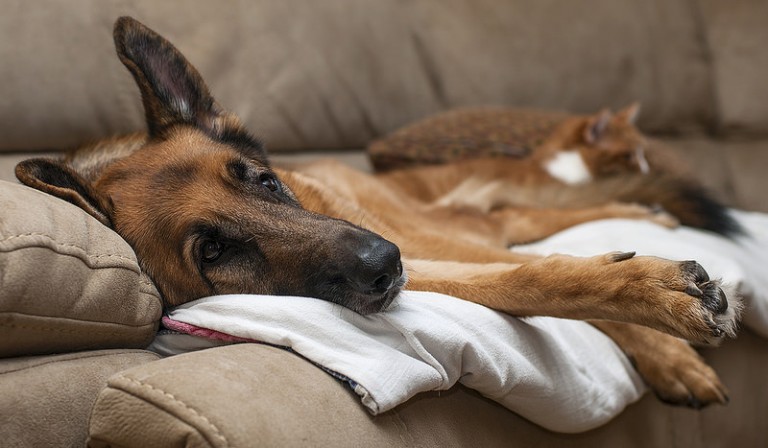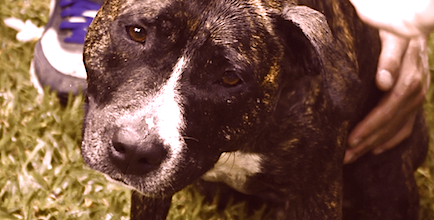What It Means When Your Dog Has Bloody Stool
When your dog has bloody stool, bowel wall inflammation is commonly the culprit. But that condition in itself could have many possible causes.

Life is funny (in the “odd” sense of the word). For example, take the same problem and different people react in different ways.
This is something every veterinarian is wise to remember, since what is a catastrophe for one client is a mere flesh wound for another.
Upset tummies are a case in point because if your dog normally has a rock-solid constitution, then an episode of diarrhea is alarming.
As a vet, I’ve experienced the full range of reactions — from the client who phones at 2 a.m. when their pooch deposits a single soft poop on the lounge room carpet, to the dog pouring blood out the back end and the client does nothing until the dog collapses.
Finding a middle path would be good, no?

Don’t leave your pet’s safety to chance
Sign up for Petful recall alerts today.

When Your Dog Has Bloody Stool
A poodle called Milly inspired this article. I saw her last Saturday.
A vigilant vet tech had made the appointment after a post-surgery phone call to see how the patient was after a routine dental descale.
The client was concerned because Milly had bloody diarrhea, but she didn’t know whether to call in or not, as Milly had a history of a sensitive stomach.
Milly wagged her way into the exam room, bright as a shiny new coin. Her clinical exam was normal (and she had sparkly clean teeth). She had a history of inflammatory bowel disease (IBD), for which she took steroid tablets from time to time.
Given that an anesthetic is stressful for any dog, it seemed reasonable that Milly’s upset was due to the stress triggering her IBD, so we beefed up her treatment.
Happily, I checked her notes yesterday, and Milly was well on the mend.
But this and a request from a staff member to view a photo of her dog’s bloody bowel movement set me thinking about IBD, colitis and sensitive tummies in general.

Why Some Dogs Get Blood in Their Poop
Blood in a bowel movement is an important sign not to overlook.
There can be a number of reasons why a dog has bloody stool, including:
- Infection: Serious infections, such as parvovirus, cause physical damage to the bowel.
- Clotting problems: If the dog has a blood-clotting disorder, then bloody feces or urine are a possibility.
- Inflammation: If the dog’s bowel wall is inflamed, this results in blood-stained stools.
What I want to focus on here is the 3rd of those possibilities: the inflamed bowel wall.
Bowel Wall Inflammation in a Dog
When you have itchy skin, you may well scratch and scratch and scratch until your skin is red and inflamed. If you keep scratching that swollen, hot skin, it bleeds.
That sore skin is the external equivalent of what the lining of an inflamed gut looks like. For itchy skin, the damage is a result of physical trauma (scratching your skin). Similarly, eating raw bones can assault the gut wall to cause physical damage.
When a dog chews a bone, it can splinter. Those bone shards then pass along the gut, scraping as it goes, like rubbing the gut lining with coarse sandpaper.
But if you don’t give your dog bones, what else can cause gut wall inflammation?
Annoying Allergies
Food allergies in people can cause potentially serious, shock-like reactions. However, in dogs, it’s more common to have itchy skin, sickness or diarrhea.
A food allergy in a dog happens when the dog’s immune system labels an ingredient as dangerous and raises an immune reaction against it. This causes inflammation and swelling of the bowel wall, resulting in the symptoms of an upset stomach.

Breed-Specific Problems
Some breeds — for example, the Boxer and French Bulldog — have a genetic tendency toward bowel inflammation.
This is a specific form of colitis and results from bacteria invading the cells of the gut, causing severe inflammation.
Colitis
The word “colitis” refers to inflammation of the colon, and this is a common condition in many older dogs. Often an underlying cause for the inflammation isn’t found.
Usually, the symptoms of blood, mucus and diarrhea are put down to the bowel not coping as it should and struggling to process food.
Food Intolerance
Food intolerance is subtly different from food allergy.
Whereas an allergy is the result of an activated immune system, an intolerance is caused by the food being difficult to digest.
- The classic example of food intolerance is milk causing diarrhea in dogs who lack the enzyme necessary to digest milk sugars.
- Another example is high-fat foods, which some dogs struggle to absorb, and this results in an upset tummy.
Immune-Mediated Disease
Food allergy is a specific type of immune-mediated disease that affects the gut wall. However, the immune system can become overactive and cause inflammation for other reasons apart from food:
- Some of these factors are recognized, such as parasites or bacterial antigens.
- But sometimes, despite investigation, a cause is never found. In these dogs, it’s thought the problem may be hereditary.
Parasites
slugging it out inside the gut is enough to turn anyone’s stomach.
However, these nasty parasites also secrete digestive juices that interfere with blood clotting. This makes it easier for them to feed — but the poor dog struggles to repair damage to the gut lining and, as a result, the dog has bloody stools.
Here are some other signs of stress to watch for in your dog:

Stress and Anxiety
Ever had an upset stomach ahead of an important job interview?
Stress and anxiety are well recognized as triggering diarrhea. This is an especially common problem in dogs, with IBD being the most common cause of sickness and diarrhea in dogs.
Again, there can be contributing factors, such as parasites or dietary intolerance, but often no underlying cause is found.
Just like Milly, when the dog is stressed, it affects their bowel movements.
Although it’s not possible to avoid all stress, you can help:
- Feed your dog an easily digestible diet containing good-quality protein.
- Conversely, some dogs respond well to a high-fiber diet, which seems to “calm” the gut.
- Offer probiotics after a flare-up. This helps repopulate the bowel with helpful bacteria.
- Steroids: The worst cases may need the anti-inflammatory oomph of steroids to settle the gut wall inflammation.
- Antibiotics: Some antibiotics, such as metronidazole, have an anti-inflammatory effect and will help some cases.
- Vitamin B12: This vitamin is vital to bowel health, and levels are often depleted after bad diarrhea.
Milly’s Treatment
To get well, Milly needed time, a bland diet, probiotics — and a one-time shot of steroids.
Happily, the bounce is already back in her bungee, and she made a full recovery.
I’m hoping her human is now going to brush her dog’s teeth every day so that Milly won’t need another descale and the stress of a general anesthetic.







